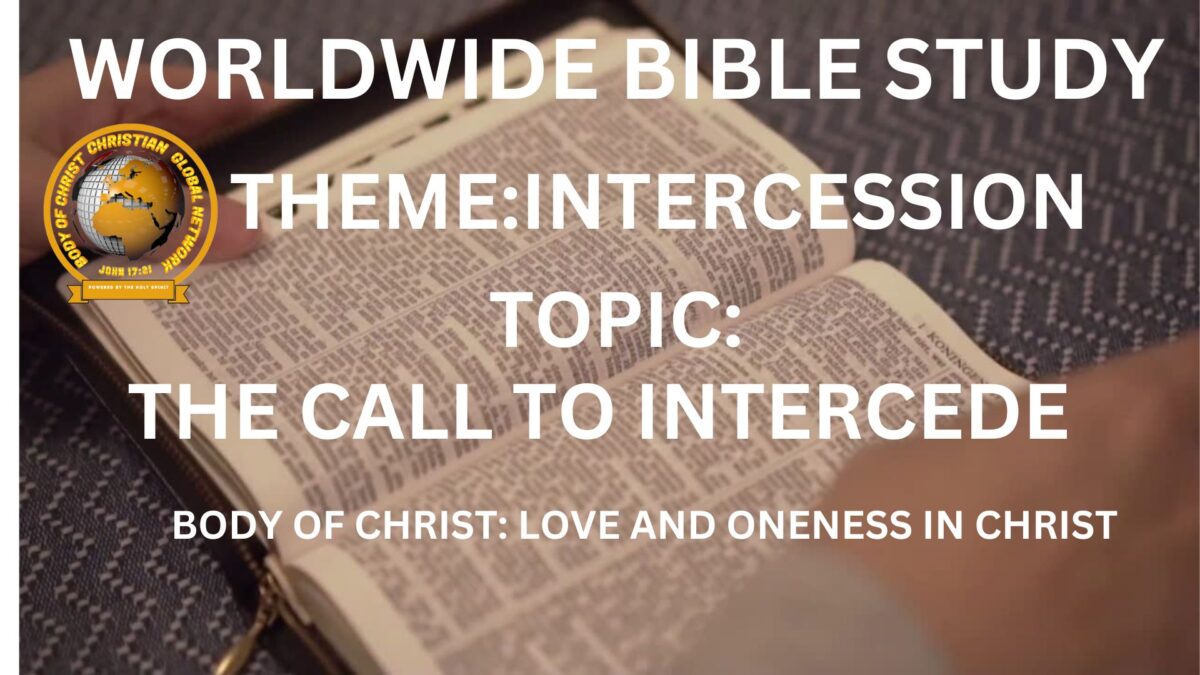Theme: This first week introduces the concept of intercession, focusing on God’s call for believers to stand in the gap for others through prayer. Intercession is about selflessly seeking God’s intervention on behalf of others, showing love and compassion in prayer.
Key Scriptures Ezekiel 22:30 – “And I sought for a man among them, that should make up the hedge, and stand in the gap before me for the land, that I should not destroy it: but I found none.” 1 Timothy 2:1-2 – “I exhort therefore, that, first of all, supplications, prayers, intercessions, and giving of thanks, be made for all men; For kings, and for all that are in authority; that we may lead a quiet and peaceable life in all godliness and honesty.” James 5:16 – “Confess your faults one to another, and pray one for another, that ye may be healed. The effectual fervent prayer of a righteous man availeth much.”
Detailed Explanation 1. The Biblical Mandate for Intercession (Ezekiel 22:30) In Ezekiel, God expressed a profound desire for someone to intercede on behalf of the people, someone who would “stand in the gap.” This imagery of making up a hedge (a protective barrier) and standing in the gap highlights the role of an intercessor as a defender against destruction and judgment. God’s Heart for Intercession: This verse reveals that God actively seeks those willing to stand on behalf of others. An intercessor is someone who bridges the gap between God’s holiness and humanity’s failures, asking for mercy and change.
Application: Intercession is not just a casual prayer but a call to action in the spiritual realm, where believers take a stand against forces that oppose God’s will in people’s lives. 2. Interceding for All People (1 Timothy 2:1-2) The Apostle Paul encourages Timothy and all believers to make intercession “for all men” and especially for “kings and all that are in authority.” This verse broadens the scope of intercession, urging prayers not just for personal needs but for leaders and society.
Praying for Leaders: When believers pray for those in authority, it brings a covering of wisdom and guidance to leadership, promoting a peaceful and godly environment. Peace and Godliness: Paul’s instruction highlights that the aim of intercession includes fostering a peaceful society, allowing God’s truth to flourish.
Application: Begin by identifying leaders, both local and global, and specific situations that need intercession. Pray that they may lead with wisdom, justice, and integrity, which can contribute to a godly and peaceful society. 3. The Power of Righteous Prayer (James 5:16) James speaks of the “effectual fervent prayer of a righteous man” as being powerful and effective. Intercession is described here as a fervent, passionate act—one that goes beyond mere words to heartfelt pleas. The Role of Confession and Healing: The verse also connects intercession with community healing, emphasizing the need for believers to support one another in prayer and to foster forgiveness and reconciliation.
Effectual Prayer: For intercession to be “effectual,” it must be accompanied by righteousness—a sincere and right-standing relationship with God.
Application: Encourage participants to pray with passion and sincerity, trusting that their prayers can bring transformation and healing.
Example of Intercession: Moses’ Prayer for Israel (Exodus 32:9-14) After Israel created and worshipped the golden calf, God’s anger was kindled against them, and He declared His intention to destroy them. However, Moses interceded on their behalf, reminding God of His promises to Abraham, Isaac, and Jacob.
Key Takeaway: Moses’ intercession was bold and selfless, prioritizing Israel’s welfare over his own safety. His willingness to step in shows that intercession can change the course of events.
Application: Reflect on how Moses’ prayer was grounded in God’s promises and character. When interceding, it’s powerful to remind God of His Word, promises, and covenant with His people.
Study Questions:
1.Why do you think God calls believers to intercede for others?
2.Discuss how intercession reflects God’s heart of compassion and mercy.
3.Explore how interceding for others aligns with the love that God commands us to have.
4.How can we apply intercession in our daily lives?
Encourage practical steps, such as setting aside daily or weekly times to intercede for family, community, church, and world leaders. Talk about finding specific needs in the community, nation, or world to focus on. Who in your life needs intercessory prayer right now? Invite participants to think about people in their lives who are struggling or in need of prayer. This can be a time for individuals to share prayer requests and pray for each other, building a sense of community. This first week sets a foundation for understanding the calling and power of intercession. By engaging in prayer for others, believers act as a bridge, inviting God’s presence and intervention into the lives of those who need it most.
